
I like Richard Barrow's blogs on Thai-Blogs.com and he just wrote a good blog about the Armstrong guns built by Rama V at Phra Chulachomklao Fort: read his blog at Disappearing Armstrong Guns.






Why would a young, successful businessman feel empty and suicidal after reaping a profit of more than 10 million baht from his direct-sales business? And what did he do with that money?
He sought solace in the Lord Buddha's dharma, or teachings.
The first cats referred, this treatise describes in their forms
Black on body, beautiful face two paws, stomach, back and tail
Nine places clear as cotton wool, eyes like jewels compared
Melodious voice, much loved by humans female and male
Whoever intends to raise them will become a master, promoted
Servants, retainers, wealth will come continually ample
With prosperity and dignity, enemies will not come near
Raising them yields results as the masters say in the treatise
One with white body, fine all over, and black in nine places
Like a piebald horse, whoever feeds it well, will trade swell
Much riches and treasures will be found, everything will come
That person is a rich man, for a good cat benefits its owner
One named fine sapphire, entirely, claws and tongue, fine black
Whichever cat you meet, black as they say, must be looked after
It will bring you all, retainers and food in ample amounts
With power, happiness, and welfare against danger
One copper, luminescent, claws, tongue and teeth as dyed red
Who raises it will gain great rank, a general or minister
One lao of flower of clear color, off-white fur, see black mixed
Who finds one, hurry to support it, that cat brings happiness
Women, men everywhere will cherish it, as this cat has charm
Loved all over by the people, both female and male
One called the jewel cat, of white body, with eyes like gems
Four black feet, ears and tail black as if ink applied
Has incalculable value, will bring great gain, more property
Who raises it will gain power, retainers and all good things
One a mercury color, a glowing shine, as if applied
Feed it well and great benefits rush in, raise it, do not doubt
One called Mongkol Amphai, the treatise says is auspicious
Black body, white neck round, good for the raiser, great wealth
One with a hourse-saddle mark, fine face with two black eye rings
Worth 100,000 gold tamleung, it brings its owner honour
One is black around the body, of great beauty, strange,
Who feeds it will have rank, power, with people fearing
One glows black all over, its nose clear white, a lovely face
Who raises, gains rank in seven months, the lords grant fortune
One with marks all over, its nose clear white, a lovely face
Who raises, gains rank in seven months, the lords grant fortune
One with marks all over, flashing beauty, strange,
Who feeds it will have rank, power, with people fearing
One glows black all over, its nose clear white, a lovely face
Who raises, gains rank in seven months, the lords grant fortune.
One with marks all over, flashing beauty, they say has dignity
Who raises, will be a minister, or chief of council, with rank
One marked large on mouth and nose, who finds it, should care for it
Will get land, fields, riches, a commoner becomes a master
One with underbelly markings is good for trade by boat
Merchants raise it hoping the cat is a bank of gold and silver
One has the line all along, good by the book, will further the family
With rank and power, replete, on an eternal base
One with amusing feet, they say to keep only for queen's lines
This cat brings virtue, so kindly do not endanger it
One marked on two ears, the treatise says should be raised by monks
For studying well, without forgetting with success as desired
They repeat in the books, one must study, raise and all will follow
Even in death, never discard the ghost, bury it, and keep the bones
In a pot to keep, which is also a virtuous act
When keeping do not despise it, or hit it, but care for it with love
Give it fine food, rice and fish, service it with everything replete
The cat will prosper, do not fret, or doubt the text
There are many more bad cats with tiger patterns,
They eat their young and have still births
Red tail markings of loss, twisted white tails, they say let go.
Here endeth the cat treatise, the bad and good in summary.
...and so a round-the-clock vigil began on the Thammasat campus. Though the university had been closed down earlier, 4,000 determined students broke through the gates and took over the Bo Tree Courtyard and the football field. There were reports later that some of these students had smuggled in firearms which, if it were true, would seem a precaution, wisely taken or not, against the kind of violence used by Red Gaurs against defenseless marchers in the anti-American demonstrations six months earlier.
While the four thousand sat cross-legged in clusters around the campus grounds, singing their protest songs and making speeches, the capital braced itself for a reprise of Fourteen October, the anniversary of which was now just 10 days off. Counter-demonstrations began right away. A group of 400 rightists protested outside the prime minister's office, on the fourth, demanding he take a definitive stand. They stayed through the night, and their angry shouts intensified the following day, 5 October, when he announced his cabinet changes. Seni had dismissed the conservative Samak from his post as a deputy in the interior ministry, and had placed the apparently neutral Admiral Sa-ngad Chaloryu at the head of Defense.
Meanwhile, at Thammasat, a troupe of students actors staged a pivotal drama, a reenactment of the lynching two weeks before of the union men who had protested Thanom's return. On a make-shift stage in the campus courtyard, a young actor was strung up on a harness to stimulate the hanging, while others portrayed those responsible for the deed. One of the performers-the one dangling from the rope- was said by some to have borne a certain resemblance to the crown prince, an unpopular figure then among the members of the left. Soon, somehow, word got out that the play had been an act of lese majeste, an insult to the crown, in which radical leftists had hanged the king's heir apparent in effigy.
By evening a photo story about the skit had made Bangkok's front pages. Dao Sayam-a "rabid, right-wing newspaper," says Anderson -printed apparently retouched pictures of the performers, exaggerating the features of the one in question to make him look more like the prince. Then, in what seems to have been a coordinated effort, the armed forces radio network broadcast a similar version of the story and urged the citizenry to buy Dao Sayam and see for themselves.
Considering the theme of the student's skit-the murder of innocent citizen by corrupt authorities- it does not seem logical that the dramatists would have planned to make the victim, who was a sympathetic figure, look like the crown prince. In another photograph of the skit, one sees a young man in the guise of a monk - apparently Thanom- seated half-lotus style beneath the dangling "corpse". In the monk's lap is a human skull; standing guard beside him is a soldier with a Nazi arm band. Several students lay about, face-down, nearby, obviously mimicking more dead bodies, those who had fallen on fourteen October. A placard beside the tableau reads "Students, don't worry. I only want a few more corpses."
Plainly, then, the hanging figure would not have intentionally resembled the prince. It simply would not have fit in with the rest of the scene if it had.
Yet, even if this was an act of mockery against the sacred institution of the throne, it would not have justified what followed. Heeding the call of the army broadcast for "all true Thai patriots" to quash the supposed anti-monarchist demonstrations, thousands of militants, led by the Red Gaurs and other neo-fascist groups, flowed into the Thammasat area and surrounded the campus.
It was now the morning of Six October, another date which requires no mention of the year to distinguish its place in Thai history.
Perhaps sensing what was to come, the NSCT (National Student Center of Thailand) leadership left the campus, not in flight but to surrender themselves to the prime minister and try to explain the true meaning of the play before the misguided mob could carry out its intentions. The NSCT leaders left behind some two-thousand of their fellow demonstrations who had spent the night on campus as promised. By the time the students leaders arrived at Seni's office, however, it was too late.
Claiming they had been fired upon from inside the campus, police who had been shepherded the mob outside called for reinforcements. By 7:30 am the streets outside the university compound were lined by special units of the police and military, armed with machine guns, recoilless rifles, grenade and rocket launchers. The mob had by now swollen to ten thousand, and as if the police needed more help, had armed themselves with swords, clubs, and guns of their own. Suddenly police and soldiers opened fire, pouring as many as 1,000 rounds per minute in sporadic intervals into the compound. They used no tear gas. By comparison, shooting a fly with an elephant gun seemed reasonable.
They smashed through the campus gates with a dump truck and charged the cowering demonstrators inside. There must have been snipers within firing upon the invaders, as photographs do show armed soldiers and policemen hiding behind trees and walls as the civilian mob carelessly blundered through the compound. But whatever armament the students possessed could not have been enough to make a difference, for soon the demonstrators were overcome by the rabble, some trying to flee, leaping into the Chao phraya River, others trying to give themselves up. Reporter Richard Nations was there.
"I saw one university student emerge from the auditorium unarmed only to be swamped by the mob and kicked and beaten to death with bottles, mangled chairs and jagged bits of metal torn from the main gates. Other students who tried to escape were hanged from the trees outside the campus. Later, their bodies were doused in petrol and burned. At least one girl was reported to have drowned among the many who tried to swim across the river to safety."
The rampage went on for hours, as police went from building to building to flush out the students. Once outside, the demonstrators were rounded up and herded into the football field where onlookers cheered from the bleachers, waving flags, and laughing as boys and girls alike were made to strip to the waist and lie facedown on the playing field; any show of reluctance earned a rifle butt in the head. Among the sprawling mass of half-clad students, prone and paralyzed with fear, strolled policemen, kicking and beating the quivering forms as they went. At least one officer went about stripping students of any Buddha images, violently ripping chains from around their necks; he said he did so "because communists are not Buddhists," but he did not mention the amulet's gold content.
By midday, police arrested 1,700 students and carted them away to detention facilities, driving them along the way, past the mutilated corpses of their friends, strung from the trees around Sanam Luang. Their job at Thammasat done, the victorious patriots marched to government house to confront the premier.
"I did my best," a tearful Seni Pramoj told the crowd. "I tried to keep law and order in this kingdom, but if you wish, I will go."
Somehow the honor and prestige of governing the people of Thailand did not seem worth fighting over now. A dark and ugly side of a normally pleasant people had just been revealed, and the Thai elite seemed revolted by it. That evening it was announced that the military had taken over the government. No one else seemed to want it anymore.
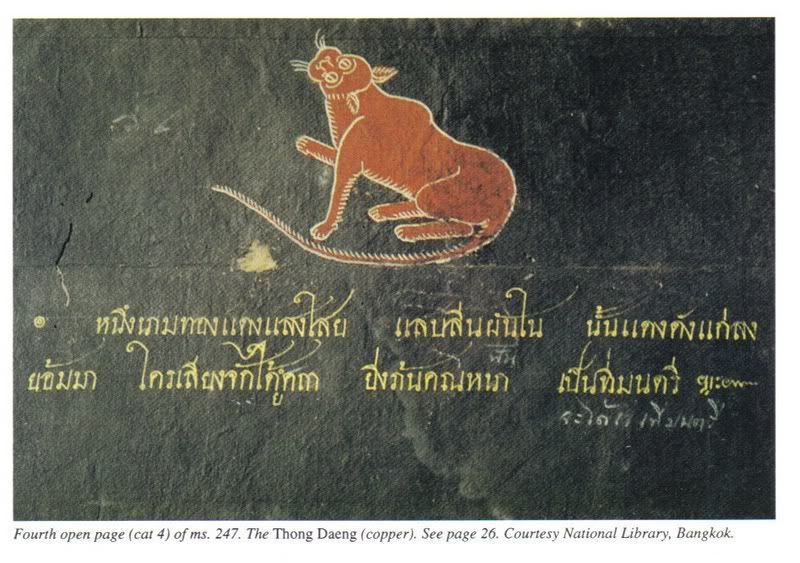
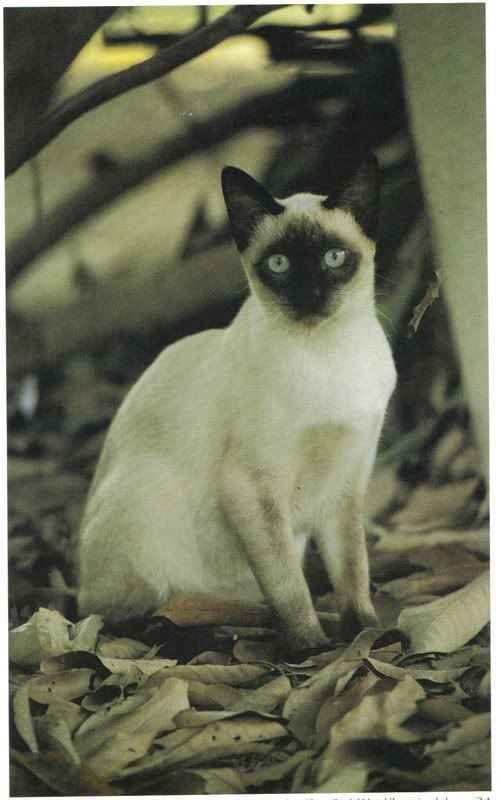 "Tamra Maew" (cat treatise or cat poems) were found in old thai manuscripts known as "smut khoi", rice paper books. The ones M. Clutterbuck used for his research were between 100-200 years old. However, research I've done previously on ancient literature revealed that manuscripts were copied by hand and passed down generation by generation in the family. They may date much older than those 100-200 years old. Another popular form of preserving ancient literature was with palm leaf manuscripts in which most buddhist literature is preserved. These are also copied by hand, and are said to last 600-700 years with correct preservation.
"Tamra Maew" (cat treatise or cat poems) were found in old thai manuscripts known as "smut khoi", rice paper books. The ones M. Clutterbuck used for his research were between 100-200 years old. However, research I've done previously on ancient literature revealed that manuscripts were copied by hand and passed down generation by generation in the family. They may date much older than those 100-200 years old. Another popular form of preserving ancient literature was with palm leaf manuscripts in which most buddhist literature is preserved. These are also copied by hand, and are said to last 600-700 years with correct preservation.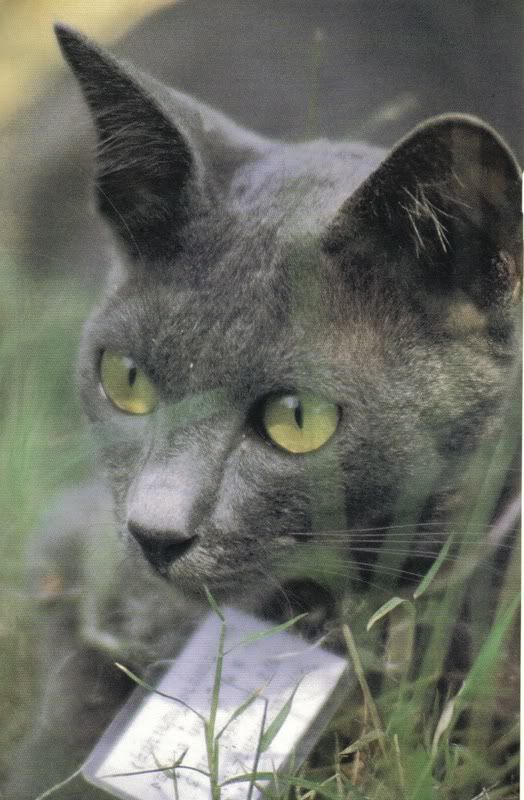
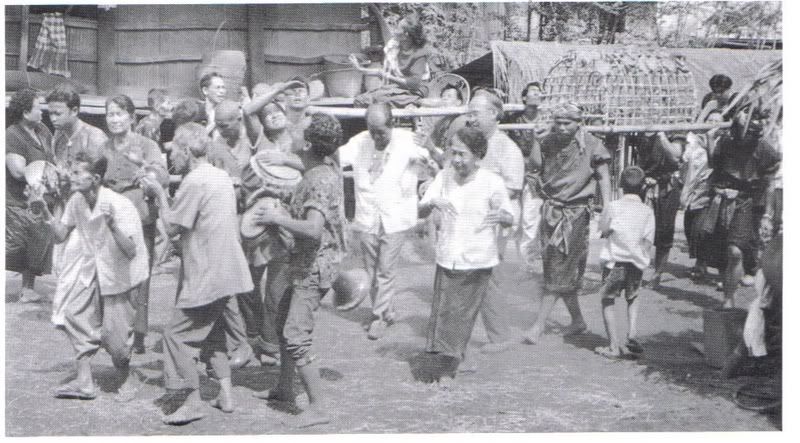
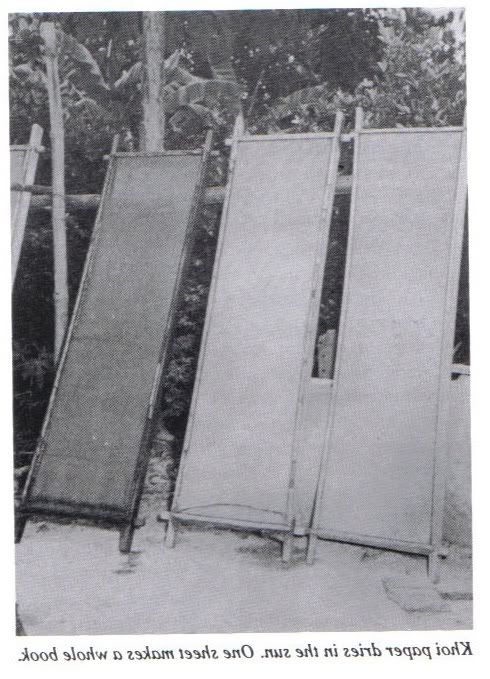 The samut khoi are made from the pulp of the khoi tree (streblus asper). This small shrub grows easily in the boggy and well-watered fruit plantations of Thailand's central plains. The stripped bark is pounded into pulp with wooden mallets: this is then poured over a wire mesh and dried in the sun. The resulting sheet is removed from the mesh and polished with stones before being folded concertina fashion to create a whole book from a single sheet. Nowadays, they are produced as luxury paper for soveneir making and exports.
The samut khoi are made from the pulp of the khoi tree (streblus asper). This small shrub grows easily in the boggy and well-watered fruit plantations of Thailand's central plains. The stripped bark is pounded into pulp with wooden mallets: this is then poured over a wire mesh and dried in the sun. The resulting sheet is removed from the mesh and polished with stones before being folded concertina fashion to create a whole book from a single sheet. Nowadays, they are produced as luxury paper for soveneir making and exports.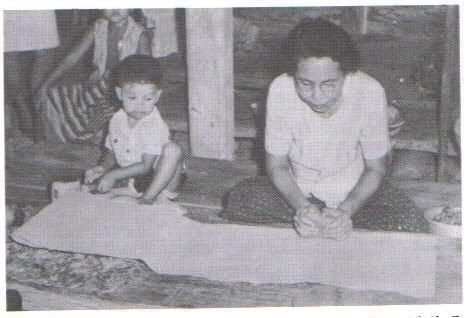 The sheet can be blackened with the charcoal of the sanoh khang khok tree to create the black "samut thai dam". If bleached with lime in the pulping process a white "samut thai khao" is produced. The black books were written on with a pastel-like white pencil, which is usually written over with yellow ink made from gambage for permanence. The white books were written on with black ink. Chiangmai-chiangrai.com has a short page about the making of khoi paper books.
The sheet can be blackened with the charcoal of the sanoh khang khok tree to create the black "samut thai dam". If bleached with lime in the pulping process a white "samut thai khao" is produced. The black books were written on with a pastel-like white pencil, which is usually written over with yellow ink made from gambage for permanence. The white books were written on with black ink. Chiangmai-chiangrai.com has a short page about the making of khoi paper books.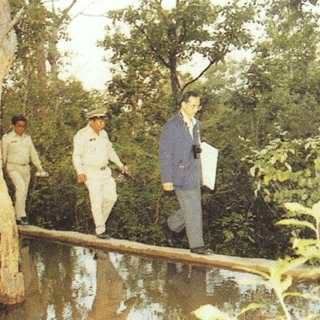
«Sustainable development is development that meets the needs of the present without compromising the ability of future generations to meet their own needs.»Thailand's economic development has been guided by several 5 year period development plans of which there have been nine, summaries of the nine plans (1961-2006) provided here.
He proposed pratical method for farmers, the 30:30:30:10 ratio of land use which work under the three following phases.
A balance in the state of mind: one needs to be strong, self-reliant, compassionate and flexible. Besides, one should possess a good conscience and place public interests on a higher priority, above one's own.
A balance in social affairs: people need to help each other, strengthen the community, maintain unity, and develop a learning process that stems from a stable and strong foundation.
A balance in managing natural resources and the environment: the country's resources need to be used efficiently and carefully, in order to create sustainable benefits and to develop the nation's stability progressively.
A balance in technology: technology should be used appropriately while encouraging new developments to come from the villagers' local wisdom.
A balance in economic affairs: one needs to increase earnings, to reduce expenses, and to pursue a decent life.
Finally,
Phase 1: To live at a self-sufficient level which allows farmers to become self-reliant and maintain their living on a frugal basis.
Phase 2: To cooperate as a group in order to handle the production, marketing, management, and educational welfare, as well as social development.
Phase 3: To build up connections within various occupation groups and to expand businesses through cooperation with the private sector, NGOs and the government, in order to assist the farmers in the areas of investment, marketing, production, management and information management.
To Live in Accordance with the Principles of Self-sufficient Economy
1. One must adhere to a frugal style of living and try to cut down daily expenses especially for extravagant items as stated in the Royal speech, ". . .One should not live luxuriously and must cut down expenses in an appropriate manner. . ."
2. One must be true to oneself and work righteously as well as honestly, even under harsh living conditions according to the Royal speech, ". . .Success of all people comes from good conduct and proper work. . ."
3. One must stop selfish competition and the habit of taking advantage of others when doing business as commonly happened in the past. This is defined in the following excerpt from the Royal speech, ". . .The meaning of genuine happiness is the happiness derived from one's fair conduct, both of intention and action, and not from coincidence or taking advantage of others. . ."
4. One must not give up in finding ways to pull oneself out of hardship, by striving to learn more and more in order to earn sufficient income, as stated in the Royal speech, ". . .The reason for encouraging people to learn more and become stable in their life is for their own lasting happiness from, first, leading a sufficient lifestyle, and then from being proud of themselves for being able to stand on their own. . ."
5. One must behave with good morality and refrain from all greeds. Thai society collapsed with this adverse economic situation because a lot of people betrayed their own country without any shame. His Majesty the King graciously delivered a Royal speech that conveys a similar message, as follows: ". . .Avoid committing wrongdoings that will destroy oneself or others, eliminate one's inner greed, remain true to oneself, as well as preserve and enhance the good virtues within oneself. . ."
"Miss Pook" was my pet cat when I was a child.
Ms. Pook's fur was three colored, mostly black, white with patches of yellow all over her body up to her tail. Her four paws were all equally white. Most prominent of all, was her face, exactly halved by fur of black and the other half, fur of yellow.
At that time, my house was a food shop in the Ta Prachan area. Therefore, Ms. Pook grew up well fed. She was a teen cat with shiny fur, playful and mischievous. She could be classified as a good natured cat with extraordinary intelligence for a cat.
There was this time when I taught her how to use the toilet bowl by carrying her with me to the bowl and showing her by doing the business myself. Since then she would pee in the toilet bowl and patiently wait for someone to come flush it down with water.
Ms. Pook lived a very common cat life. We would rarely see her catch a rat. If she did, she was just following her cat's instincts. Once she caught and killed a rat, she would play with it rather than eat it because she was already well fed.
My Ahmah loved cats. She would have fresh platoo (thai fish) in the fridge ready to mix with rice for Ms. Pook to eat every morning and evening. Ahmah would call Ms. Pook to eat by knocking the aluminium bowl on the floor. Its sound, a few "peng! peng!" would miraculously produce Ms. Pook from whichever corner she was hiding in to faithfully appear immediately in front of that bowl.
On the morning of 6th October, BE 2519, I got up as usual to shower and get ready to go to school but found that the shop was not open. My older brothers told me that I didn't have to go to school because there was a violent situation at Thammasart University. I was secretly happy to not go to school, but a little bit sad because I wasn't able to send my art homework on which I had deligently colored during the whole week.
At 7:00 am, a thunderous sound, as if something gigantic fell right next to my house startled and frightened me. We had become accustomed to the sound of guns and bullets because our house was located close to Thammasart and Sanamluang, a strategic location during that time.
This incredulous sound was not like before. I felt as if great danger was falling upon us. Ms. Pook was all puffed up, hair on ends, running around like mad, her eyes filled with terror I had never seen before. Ahmah tried to catch her but couldn't. We didn't know which part of the house she went to hide. That was the moment when many occurrences took place in my house.
Many strangers came into our house and were herded away.
My elder sister nearly got taken away in the herd, fortunately, my mother managed to pull her back.
Many uniformed men came into my house and ransacked the house, rudely shouting at my mother's and father's faces.
One of my older brothers got hit in the back of his neck with a riffle end when he moved towards the door to answer a frantic knock on the door. He was dragged out in front of my mother and father. After that I heard the sound of a round of machine gun. My elder sister fainted. My mother's heart shattered.
My aunt had a house in Pratoonam. She sent her daughter for us to take refuge there.
"Go and help bring the kids and the elders. If you can't help them out, then don't come back!", my mother recounted my aunt's orders.
My brothers and sisters, my mother, and myself, altogether five of us took refuge at Pratoonam for nearly a month. When we returned to our Taprachan home, I found that my father had taken Ms. Pook away to some place where she wouldn't find her way home. My heart ached, it reflected the terrible atmosphere in our family at that time.
Sadness remained in my heart for some time, but one day my brothers voices woke me up calling me to come look at something. I sleepily walked downstairs and saw there Ms. Pook looking at me with wide eyes, her fur all dirty and mangly. I called her name and ran down to hug her to myself with joy, but there were no more tears. They had dried up since the morning after October 6.
They say that cats loved the house, dogs loved their owners. So if a cat ever got lost or deserted, it would always find a way home, just as Ms. Pook did.
I wanted to ask her, where had she been, how difficult had it been, what did she encounter? All I could do was to pet her all over and rub her chin as she liked. If she could talk she would probably have asked me, and you, how were you when I was gone, did you think of me? But all she could do was to nudge my hand and try to wrap herself around my legs.
Ms. Pook came back to live her happy normal life with us. Many times, when I returned home from school, I would find her languidly sunbathing under the evening sun shining in through the windows. Her shiny black fur sofly reflecting the light would always invite me to go pet her and give her a rub under her chin.
I don't know if Ms. Pook remembers any of the trauma of October 6. I believe that if she can be so intelligent to do many things beyond normal cats, she would remember all the good and bad things that have happened no less than my own memories.
Only different from us...
Human memory is a wound cut deep in the heart,
Never forgotten.

"Since 1973, Thai workers have migrated to Middle Eastern countries such as Saudi Arabia, Iraq, Kuwait, United Arab Emirates, Bahrain and Qatar. Saudi Arabia was once the largest labor market for Thai workers. In 1990, following a diplomatic break between the two countries, there was a sudden reduction in the demand for Thai labor. Thai migrant workers had to turn to the job markets in Southeast Asia (Singapore, Malaysia, Brunei) and East Asia (Japan, Taiwan, South Korea and Hong Kong). As of 1995, an estimated 627,815 documented and undocumented Thai migrant workers were scattered around the world."
Source: A White Paper from pacific.net
"More than just a welcome respite from the drudgery and discipline of factory jobs, these excursions allow labor migrants to make important claims about their experiences as members of the Thai nation-state. As tourist-consumers, migrant workers appropriate powerful signs and symbols of modern Thai identity and status; in so doing they contest (and at least partly rework) their material and ideological marginalization within contemporary Thai society."
1. Principles and Rationale
1.1. Pursuant to the Prime Ministerial order No. 66/2523 of 23 April 1980 pertaining to the policy "Struggle to Win Over Communism" which required that the "Struggle to Win Over Communism be completed within a short period of time by conducting a continuous political offensive", the Cabinet on 20 April 1982 endorsed the recommendations put forward by the Committee on the Policy to Struggle to Win Over Communism concerning a "Plan for Political Offensive", and hereby ordered by Government agencies concerned to follow the guidelines laid out in this plan as well as other plans which the Committee may add in the future to complement it.
1.2. The important factor in the struggle to win over communism and destroy all forms of authoritarianism (totalitarianism) is the development of democracy. The people desire that the nation becomes democratic under the leadership of the monarchy, but because the political development towards democracy has been delayed and is full of shortcomings, the communists have used these conditions as the basis for a propaganda campaign to compete for the people's loyalty. However, the "democracy" spoken of by the communists is only a tactic to win over the state so that eventually a conversion can be made to socialism and communism. Therefore, better and true democracy, both strategically and tactically speaking, must be developed within a short period of time. The personnel who will be the main instrument for achieving this task, are to be government officials in every agency as well as ordinary people with idealism who are prepared to co-operate to bring about a model democracy in our society.
2. Objectives and Policy
2.1 To promote true faith and understanding that sovereignty rests with the people.
2.2 To create a balance between individual freedom and this collective sovereignty.
2.3 To destroy all forms of authoritarianism and form a democratic society under the leadership of the monarchy and based on the guidelines of democratic beliefs.
3. Operational Framework
An organizational unit composed of government officials and idealistic ordinary people as core members is to be created to direct the campaign. This unit is to be responsible for safeguarding the people's interests, creating true democracy and fulfilling the basic needs and desires of the people by:
3.1 Enabling the people to live in happiness and security, both personal and material, free from exploitation and repressive influences.
3.2 Enabling the people to live with honor and dignity, and to participate in and lead political processes, for they are the owners of the country.
3.3 Enabling the people to live with hope and faith in their faith in their future and their nation's security.
4.Operational Guidelines
4.1 The task of developing democracy has two parts: one is to promote faith and understanding that sovereignty rests with the people by destroying authoritarian power and influences from the local to the national level, and the other is to promote individual freedom by making laws which are laws. Due to the existence of many constraints such as resources and laws which must be amended or annulled, this task cannot be accomplished completely in a short period of time, but should be done in continuous stages with a full awareness of the special characteristics of Thai society and contextual limitations...
4.2 In addition to the operational guidelines laid down by Order 66/2533 of 23 April 1980, the following operational guidelines are to be followed:
4.2.1 Faith in the value of democracy... must be promoted by disseminating and improving knowledge of democracy both in theory and in application; providing true information about the prevailing situation; educating the mass media which are to act as an instrument for transmitting correct knowledge and understanding of democracy to the public at large; and ensuring that governmental officials conduct themselves in an exemplary and democratic manner.
4.2.2 The discharging of their respective responsibilities according to democratic principles by all state mechanisms must be accelerated at two levels. At the highest level of decision-making which involves politicians, political parties and top administrators... policies must be laid down clearly, positively and coherently to solve the nation's fundamental problems... strong and decisive response must be made to cope with day-to-day problems as they develop in accordance with principles of justice and interests of the people as a whole; opportunity must be made open for others such as academics, mass media, interest groups and various experts or specialists to partake in solving of such problems... The bureaucracy as a whole must be improved to strengthen the conditions for creating and developing democracy, and bureaucrats must be made to develop a conscience and sense of duty together which idealism to be responsive to the people in a responsible way, strictly to enforce the law and bring justice for one and all... At the level of civil servants, improvements must be accelerated because all civil servants, have an important role in putting into practice the national policy but at the moment are still lacking in the sense of duty and idealism necessary to promote popular sovereignty and generate respect for the law. All civil servants are to ... search for sources of a remedy for corruption ... discharge their duties and responsibilities strictly ... and within limits ... prevent fellow civil servants from acting as lords and masters of the people and exploiting them, and at the same time bring to justice those who break rules... (In addition) the bureaucratic system must be reformed and decentralized, delegating power and responsibility towards regions and localities..., and sufficient salary and welfare must be provided for all civil servants, especially those at junior levels, so they can uphold their own honor and dignity.
4.2.3 Popular participation in political activities must be promoted to enable the people to have more practicle experience which can serve to strengthen their attachment to an understanding of the principles of popular sovereignty. This must be done by involving the people in activities near their places of residence such as in the tambol councils, village committees and co-operatives ...; encouraging the use of political parties as a means of promoting their own interests at the national or local level in accordance with the principles of democracy...
4.2.4 Activities of pressure groups and interest groups must be regulated. Pressure and interest groups can act either to reinforce or to obstruct the development of democracy. Therefore, to ensure that their role be a constructive one and to deter any such group from hindering this development, their activities must be regulated in the following ways:
Economic Groups Because Thailand has a liberal economic system but its state mechanisms for mobilizing resources and distributing benefits are still weak, some economic groups have been able to take advantage to build up monopolistic power which inflicts social injustice and material hardship on the people, creating conditions for war. Moreover, some of these monopolistic groups have been able to develop great political bargaining power which is an obstacle in the development of democracy. Although it is vital to regulate these groups, the process of regulating them should be taken step by step and in accordance with the law ... The guidelines for cutting down the monopolistic power of the economic groups are: accelerated enforcement of the law against any violation by business; use of strict legal measures to guard against any violation by business; use of strict legal measures to guard against and destroy monopolistic power; enhancing among traders and capitalists the feeling of social responsibility and commitment towards the collective interest of the nation, by commending those with a social conscience, education, and opening up opportunities for participation in solving problems caused by their peers, and use of appropriate monetary, fiscal, legal and administrative measures on business, industry and commerce to bring about a distribution of economic benefits among the people at large.
The Masses. Workers and farmers are important in that they form the crucial foundation for Thailand's revolution and are targets for competition among political groups including the communists. Therefore, to prevent opposition groups from winning over them, to save them from being victims of communist propaganda and to generate their support for the development of democracy, the following guidelines for action should be taken. Support should be given to mass organizations which are truly democratic to prevent their leadership from falling into the hands of opposition groups. Leadership of mass organizations should be won over to destroy the subversive power of the communists within these organizations. A political environment conducive to mass political activities based on the principles of democracy should be created and encouraged.
Students. Students are a special group which has high political awareness and seeks democracy and social justice. However, because their experience is limited, they are targets for communist groups and used as a part of the united front constructed by the latter. Therefore, to utilize students as a force for democracy and to prevent them from becoming tactical tools of communists as well as other authoritarian groups, the following guidelines for action should be taken. Freedom should be given to students to conduct all their activities, including political activities, which are within the law and the regulations laid down by their academic institutions. Students' activities geared towards the development of democracy be incorporated in the syllabus at every level of education and appropriate textbooks prepared by academics as standard of references for the future.
Progressive Groups. There are now many groups which have become more politically active in urban areas, including those who have returned from the "jungle", various progressives, communists, united fronts and other democratic groups. To ensure that their activities be kept within bounds imposed by national security considerations and contribute towards the development of democracy, the following guidelines for action should be taken. Opportunities should be given to all groups to put forward ideas and suggestions within the limits of the Constitution and law. Strong democratic movements should be encouraged in accordance with the Prime Ministerial Order No. 66/2523 dated 23 April, 1980. Leadership of Progressive ideas should be won over. Activities of those groups which constitute a threat to national security and the development of democracy should be closely and continuously observed and obstructed.
Mass Media. The media can act either to promote or to destroy democracy. Therefore, to ensure that they are constructive for democracy, the following guidelines of action should be taken. Members of the mass media who have democratic ideas should be commended and given support and special responsibility in providing new conducive to the development of democracy encouraged. Campaigns to use ideas as a means of promoting democracy by the mass media should be supported. The government's mass media organizations should be used to promote democracy and counteract news which cause its destruction. News which have adverse impact on the democratic system should be curtailed by executive as well as legal measures.
Armed Forces and Formation. They should have a correct understating of democracy and support and preserve this system.
27 May BE 2525
(27 May 1982)
(Signed) General Prem Tinsulanond
Prime Minister
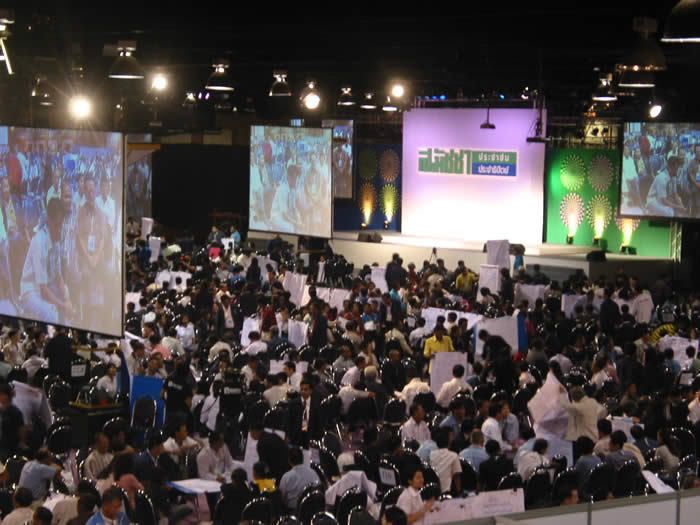
"As a member of 1960s generation, I grew up in the midst of the search for the meaning of life...."
"It was accomplshed by a handful of conspirators with a few hundred troops and involved only one casualty. It succeeded initially on surprise and bluff, then on the Promoters' holding of princely hostages, and finally on the sanction conferred by royal approval - all of this taking only a few hours. The public was not even aware of what was happening until it was all over, and before noon on June 24, the life of Bangkok and Siam was proceeding normaly, but with new leaders at its top.
The 114 Promoters of the 1932 coup could not have succeeded as they did if they had not included in their ranks a small number of senior military men, whose membership in the group lent it credibility. It may perhaps also suggest the extent to which officials had begun to lose faith in the old order. These men, indeed, were relatively conservative, certainly compared with the youthful left-leaning civilians led by Pridi Phanomyong. It was they who dominated the first constitutional regimes until the late 1930s. The most important of these were Phraya Phahonphonphayuhasena (Phot Phahonyothin) and Phraya Songsuradet (Thep Panthumsen), both colonels by 1932. Phraya Song held a top post at the military academy in Bangkok, which gave the conspirators access to a broad range of contacts and an increasingly indoctrinated cadet corps. His tactical genius made it possible to neutralize a strong army and government with a handful of troops. Phraya Phahon was distinguised by a personal integrity that made him acceptable to all factions of the Promoters as the leader of the People's party.
Having induced the king to recognize and validate their actions, the Promoters undertook to organize a government under a provisional constitution of June 27. In order to minimize internal resistance and avoid the dangers of foriegn intervention that they thought civil strife might invite, the Promoters initially stayed in the background, though they were still firmly in control. The long-term political program drawn up at the time by Pridi envisaged a three-stage process of political development. The first stage had now begun, with the adoption of a provisional constitution establishing an Assembly of seventy members appointed by the Promoters and a smaller People's Committee drawn from and responsible to it. A second stage was to begin within six months under a constitution similar to that drafted for Prajadhipok in March, with a half appointed and half indirectly elected National Assembly. A third stage of full representative government was to be inaugurated when half the population had completed primary education or within ten years, whichever came first. The general framework was defined in terms of the political leadership and tutelage of the People's party.
This party had as yet no mass membership or following, nor had it even substantial control over the army, so the first government it constituted displayed at least the facade of wide support. The first National Assembly included in its membership numerous senior officials, including some chaophraya of the old regime, amounting to about one-third of the total membership. The president of the Assembly was Chaophraya Thammasakmontri (M.R.W. Sanan Thephastsadin), a former minister of education. On the People's Committee, which handled the day-to-day administration of the governement, there were eleven promoters, including the leaders of their four chief factions, and four senior officals. Of the latter, the most important were Phraya Maopakonnithithada (Kon Hutasing), a respected judge of the Court Appeals, and Phraya Sri Wisarn Waja, former undersecretary of the Ministry of Foreign Affairs and adviser to King Prajadhipok. Phray Sri Wisarn was the new foreign minister, and Phraya Mano became prime minister and minister of finance.
Meanwhile to consolidate their power while experienced hands ran the government, the People's party reorganized the army and navy to put their men in key positions and began trying to build a popular constituency. They quickly discovered that the first course was much easier than the latter, that people would not attend rallies and demonstrations unless ordered to do so, and that many now seeking to join their ranks were motivated by desire for jobs in the new government. The lack of dependable popular support clearly became evident within a few months. It left the young civilian faction within the People's party at a severe disadvantage in competing the influence with the military and with senior civilians with the bureacratic experience and networks of connections within the elite.
Once the permanent constitution of December 10, 1932, came into force the conflicts and competition latent within the ruling coalition began to erupt."
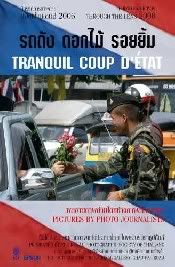

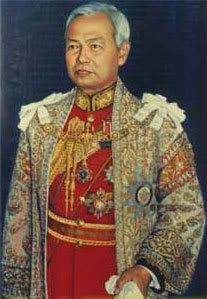
1st Prem Cabinet (3 March, 1980-11 March, 1981)
Coalition partners: Social Action Party, Chart Thai, Democrat, Chart Prachachon and Siam Democrat
Major opposition: Prachakorn Thai
2nd Prem Cabinet (11 Mar 1981- 8 Dec 1981)
Coalition Partners: Democrat, Chart Thai and a number of smaller parties including Siam Democrat, Ruam Thai and Social Democrat
Major oppposition: Social Action and Prachakorn Thai
3rd Prem Cabinet (9 Dec 1981-30 Apr 1983)
Coalition Partners: Social Acion, Democrat, Chart thai and a number of smaller parties
Major opposition: Prachkorn Thai
4th Prem Cabinet (30 Apr 1983-11 Aug 1986)
Colatition partners: Social Action, Democrat, Prachakorn Thai and National Democrat (replaced by the Progressive party in Sep 1985)
Major opposition: Chart Thai
(In Jan 1986, there was a reshuffle within the Social Action Party for its allocated quota of cabinet seats)
5th Prem Cabinet (11 August, 1986-28 April, 1988)
Coalition partners: Democrat, Chart Thai, Social Action, Rasadorn
Major opposition: Prachakorn Thai, United Democratic, Ruam Thai, Community Action, Progressive
Source: "The Military in Thai Politics, 1981-1986", by Suchit Bunbongkarn, published by the Institute of Southeast Asian Studies, 1987.
"Censorship exists to some extent in all modern countries, including the U.S.A., the U.K., Germany, France, Singapore, Australia and New Zealand."
Serendiptiy
"The president of the Council of National Security will countersign the royal command to appoint members of the National Assembly, president and vice president(s) of the National Assembly."
"Having travelled around the world, I thought I'd had enough. It was time for the soil to go back to its roots, back to where it belonged. And it was time for me to go back home and answer that little boy's query - I wanted to tell him that the great blue ocean and sky actually lie within his own heart."
Pramuan Pengchan from Chiang Mai
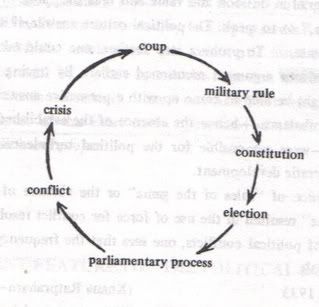
"After a coup ws successfully staged, the coup leaders would be in control for a period. Then a constitution would be promulgated out of political pressure, to be followed by an election. This could be interpreted as giving democracy a try or to give in to demands for an open system. After the election, a parliament would be in session with a government to be set up. then conflict would occur and solution would not be avilable turning the whole process into confusion. It would reach a crisis which would render the government immobilized. In the state of near chaos, a military seizure of power in a coup would take place. Thus the process is complete after a while, the system would again be let loose by the promulgation of a constitution and so on."
